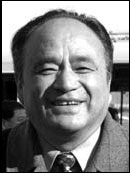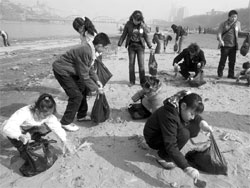China will draft and amend a series of laws to further
protect the environment from rapid economic growth. 
The draft circular economy laws promote sustainable development through a
tightened legal framework, and would be submitted to the Standing Committee of
NPC for review in August.
The law is expected to pass at the end of this year before the 10th NPC ends
its five-year tenure in early 2008.
The draft law encourages the efficient use of resources and energy, while
minimizing waste, through its "3-R principle": reduce, reuse, and recycle.
Mao Rubai, chairman of the Environmental and Resources Protection Committee
of the National People's Congress (NPC), said the draft includes provisions on
basic "management requirements" to reduce resources, and reuse them where
possible.
"Some mandatory systems with details are written into the draft, which
provide the law with a high feasibility," Mao said.
For example, there is an article instructing industry to be responsible for
collecting and recycling packing materials of its own products.
|

Volunteers in Lanzhou, Gansu Province, pick up garbage by the bank of
the Yellow River. More than 60 netizens and their family members worked
together to clean up the riverside. Jiang
Shenglian |
The draft also demands the various economic sectors, even government, reuse
wastewater, solid waste and waste heat, where possible.
The draft also calls for the recycling of other large waste products such as
electronic waste, abandoned auto and ships, and other mechanical products.
Incentives such as preferential tax policies are offered to organizations
that take an active role in China's "Circular Economy" - growth through
sustainable development. There are also penalties if they don't.
China has learned much from other countries, such as Germany and Japan, which
have healthy economies and advanced waste recycling measures, Mao said.
The revision of the Clean Water Act was awaiting review by the NPC Standing
Committee.
Law changes include heavier penalties for polluters. Penalties were
previously capped at 200,000 yuan ($25,000), but once the law is passed,
polluters will be fined daily until the problem is rectified.
"The penalty should be calculated from the day that factory is found guilty
of pollution discharge until the day its emissions meet environmental protection
requirements," Mao said.
Many industries have flouted the current law with penalty caps - opting to
pay the fine, as a cheaper option to fixing the pollution problem.
If the cap is removed, Mao said: "Factories (will) fully realize the
importance of abiding by environmental protection law."
The amendment also includes compensation to victims of pollution, Mao said.
(China Daily 03/08/2007 page7)
